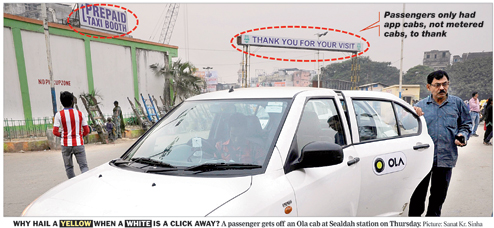• Fear of app cabs on Wednesday: Metered taxi operators stick to their plan of a 48-hour strike to pressure government into taking steps against app cabs
•? Fear of app cabs on Thursday: Taxis supporting the strike return to the roads in the afternoon after seeing app cabs fill the vacuum created by their strike
The first day of the 48-hour taxi strike called by Citu boomeranged on those driving the agitation, bringing many of them back in business in the afternoon to combat the app cabs that had ensured they weren't missed much.
Uber, Ola and TaxiForSure had bridged the gap created by the absence of yellow and white-and-blue metered taxis in the morning, thanks to almost 15 per cent more "driver partners" on the road.
The waiting time for a vehicle was longer but app cabs were available across the city and mostly at regular fares.
So shaken were the unions by the prospect of their strike not having any impact on transport that many metered taxis were out on the streets by afternoon. "I saw that the strike had no impact since morning. A friend of mine who drives an Ola cab was out since 4am and had made 10 trips by noon. I couldn't sit at home any longer," Ratan Swarnakar, who owns the taxi he drives, told Metro.
Hundreds of other taxis were ferrying or looking for passengers in the second half of the day, so much so that many commuters didn't even notice that there was a taxi strike. "As on other days, I booked an Uber from home, which picked me up from my doorstep and took me to my office in Sector V. I stopped depending on yellow taxis a long time ago," said Avishek Banerjee, who works with an MNC in Sector V.
If app-cab loyalists like Avishek had little to complain about, many of those trying one for the first time found the convenience and comfort worth a second try. Be it Uber, Ola or TaxiForSure, every operator had cars stationed across the city - from Thakurpukur to Dum Dum, Salt Lake to Tollygunge.
At 2.35pm, Metro tapped the Ola app for a pick-up at Karunamoyee near Tollygunge and found cars available in all four segments - mini, sedan, TaxiForSure and Kaali Peeli. Better still, all of them were just six to 11 minutes away.
An Uber driver said he made 18 trips between 4am and 3pm while a TaxiForSure operator had had 11 rides between 6am and 2pm. "I have been driving non-stop from 2am. I had thought of taking a rest but there is such high demand that I thought of working a bit extra. The labour has paid off," said Amjad Ali, the Uber driver.
Anil Kumar Singh, who takes out his TaxiForSure cab at night and runs a shop in Bhowanipore in the morning, kept his second business shut so that he could drive his taxi all day. "Demand is huge, so I decided to skip my shop duty and drive my car since morning," he said.
Citu, along with the Bengal Taxi Association and two other taxi unions, had called the two-day strike after a meeting with the transport secretary on Wednesday ended in a stalemate. The taxi operators are demanding a hike in fares and the waiting charge, scrapping of fines for passenger refusal and the state government's intervention to curb the growth of taxi aggregators like Uber and Ola.
Ironically for them, the strike served to underscore the value of app cabs as a viable alternative to metered taxis. The absence of crowds at auto stands and bus stops during a taxi strike that threatened to keep 20,000 of the 30,000-odd city taxis off the roads is rare for Calcutta.
In the morning, Howrah and Sealdah stations and the airport did present the familiar picture of people being harassed in the absence of taxis. But as the day progressed, several Volvo buses were deployed at the airport and even metered taxis were spotted lining up for passengers at the railway stations.
Most yellow taxis that plied on Thursday resorted to random "surge pricing", a term coined by app-cab aggregators to denote higher fares in a particular area when demand soars and supply is low.
"A taxi driver charged me Rs 100 more than the metered fare. I didn't complain since he was plying on a strike day. In any case, I would have had to pay more had I hailed an Uber, which was showing 1.8 times the regular price," said Subhasree Basu, who had hailed the taxi from Gariahat for a ride till Howrah.
There were also passengers like Sudipta Chatterjee, an elderly banker who downloaded the Uber app on his mobile phone with his son's help. "I am not that tech-savvy. On Thursday, my son helped me download the Uber app and I got a free ride to office on a strike day (a promotional offer for new riders)," he said.
The taxi unions were left red-faced by the turn of events.
Bengal Taxi Association secretary Bimal Guha switched off his mobile phones while Suman Guha of the West Bengal Drivers' Welfare Association insisted that only those drivers who were affiliated to the ruling party plied their taxis.
Ashwin Dias, general manager of Uber in Calcutta, had reason to be delighted. "We had sent out messages to our driver partners to be online for more number of hours than on a normal day," he said. "There were about 15 per cent more cabs on the road today."
The app downloads were a bonus. "We saw a 10 per cent increase in downloads compared," Dias said.
Competitor Ola, which also runs the cheaper TaxiForSure brand, declined to comment. But several Ola drivers said there was no shortage of taxi options.
Additional reporting by Anasuya Basu












